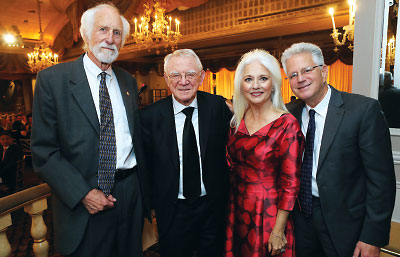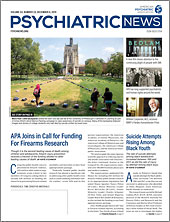When he first learned that he had been picked to receive the 2019 Pardes Humanitarian Prize in Mental Health from the Brain & Behavior Research Foundation (BBRF), William Carpenter, M.D., had two simultaneous thoughts: “I was deeply moved, but also didn’t know what humanitarian work BBRF was talking about. I have some accomplishments I feel good about, but I don’t think they rise to the level of a humanitarian.”
Carpenter is a professor of psychiatry at the University of Maryland School of Medicine and former longtime director of the Maryland Psychiatric Research Center.
The award’s namesake, Herbert Pardes, M.D., president of BBRF’s Scientific Council and a past president of APA, might care to disagree. “There are many superlatives I could give for Will; he is one of the most modest yet best-informed people I have ever known,” he said in remarks at the 2019 BBRF Research Symposium in November. “But I want to focus on one characteristic. Whenever you need to consult with someone, you look for someone with the highest credibility on that topic. For schizophrenia, that person was always Will.”
“I was ecstatic when I heard the news,” Pardes continued. “I count Will as a great friend of mine, a great friend to many others, and a great friend to all people with schizophrenia, whom Will has championed for over 40 years.”
In addition to being actively involved with BBRF since the organization started back in 1987, Carpenter has lent his expertise to defend the appropriate use of placebos in psychiatric clinical trials (his efforts helped narrow the restrictions to placebo use set forth in the Declaration of Helsinki ethical guidelines) and defend mentally ill individuals in court (notably John Hinckley Jr. and John DuPont). In 1989, Carpenter was also a part of a historic State Department delegation that investigated human rights abuses involving psychiatric hospitalization in the Soviet Union (
Psychiatric News).
Carpenter has also been instrumental in recharacterizing schizophrenia as more than a single illness of disordered thoughts. His efforts started with his time working with the World Health Organization (WHO) in the 1970s when he and colleagues published numerous studies cataloging when various signs and symptoms emerged in patients with schizophrenia. Those studies highlighted the inadequacy of regarding schizophrenia as a single entity and called for research to focus on each specific element of the disorder. Years later, as chair of the DSM-5 Work Group on Psychotic Disorders, Carpenter would help codify schizophrenia as a heterogenous clinical syndrome.
Today, schizophrenia is understood to be a complex disorder that varies among patients in both symptom profile and which brain mechanisms are involved. Schizophrenia symptoms are also observed in other psychotic disorders, suggesting that much is shared across diagnostic boundaries.
The impact of Carpenter’s research could be seen in presentations given by other award winners at this year’s research symposium. Sophia Grangou, M.D., Ph.D., a co-winner of the 2019 Colvin Prize for Outstanding Achievement in Mood Disorders Research for her work exploring risk and resilience in bipolar disorder, thanked Carpenter for highlighting how studying resilience can help to inform psychiatric care.
Also recognized at the BBRF symposium were James Kesby, Ph.D., a fellow at Australia’s Queensland Brain Institute, and Cristoph Kellendonk, Ph.D., an associate professor at Columbia University Medical Center. They received the Maltz Prize for Innovative Schizophrenia Research for their research on the brain circuitry problems that underlie the social, emotional, and cognitive symptoms of schizophrenia. These symptoms historically have not received as much attention as hallucinations and delusions, but they are especially debilitating to patients and are not well managed with antipsychotics.
“Throughout his career, Dr. Carpenter has taken a person-centered, rather than an illness-centered, view of schizophrenia, which has led to more compassionate care for people with this illness,” said Jeffrey Borenstein, M.D., president and CEO of BBRF. “He has played a critical role in shifting the focus of treatment to the earliest stages of the illness, when interventions may have their most profound impact and maximize the likelihood of recovery.” (Borenstein is the editor-in-chief of Psychiatric News.)
True to his modest nature, Carpenter downplayed some of these achievements. In regard to helping BBRF grow from a small organization to the largest private funder of mental health research grants, he told Psychiatric News, “I helped the organization get the first $50,000, but the Liebers [BBRF chair Steven Lieber and his late wife, Connie] partnered with Herb Pardes, created the lasting success.”
Carpenter said that receiving an award with Pardes' name on it was deeply meaningful and announced how he will use the $150,000 honorarium that comes with the prize. “Our research center is doing quite well, but we have no endowed funds,” he said. “I told the University [of Maryland] that I would use the prize as the start of a five-year pledge to provide $750,000 to create an endowed professorship in psychiatry if they would match it.”
With a smile, he added that the University of Maryland instantly agreed. ■

